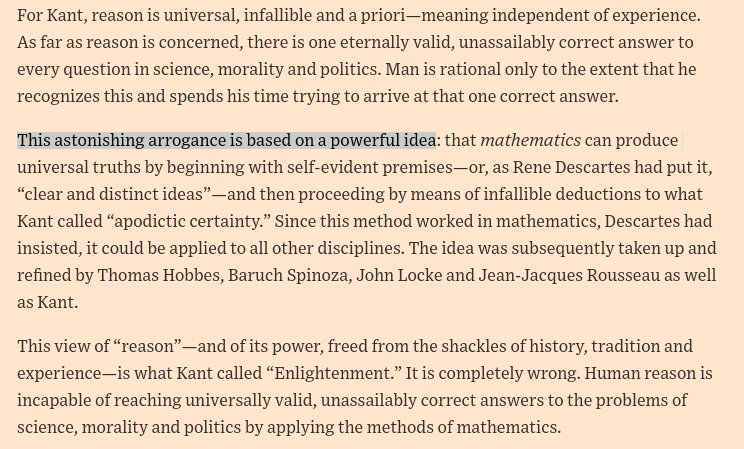
There are lots of ways to "win" as investor.
Focusing on valuation is one of them. But you have to be really:
* Smart
* Willing to put in lots of work
* Aware of what market is doing daily
My approach:
I PAY ZERO ATTENTION TO VALUATION.
It's worked. The proof & thinking 👇
Focusing on valuation is one of them. But you have to be really:
* Smart
* Willing to put in lots of work
* Aware of what market is doing daily
My approach:
I PAY ZERO ATTENTION TO VALUATION.
It's worked. The proof & thinking 👇
What I look for are ANTIFRAGILE companies.
They all:
* Use the Barbell Method (Mission, Moat, Optionality)
* Have Financial Fortitude (Balance Sheet, no Concentration)
* Have Skin in the Game (Founder, Ownership, Glassdoor)
If they have these 3, I don't worry about valuation
They all:
* Use the Barbell Method (Mission, Moat, Optionality)
* Have Financial Fortitude (Balance Sheet, no Concentration)
* Have Skin in the Game (Founder, Ownership, Glassdoor)
If they have these 3, I don't worry about valuation

The basic idea:
When chaos hits, ppl in real world don't care about valuation of a stock.
* Schools: $ZM will help us with COVID (no one cares about stock price)
* Citizens: Our police need to use $AXON (no one cares about stock price).
Some real examples from my port
When chaos hits, ppl in real world don't care about valuation of a stock.
* Schools: $ZM will help us with COVID (no one cares about stock price)
* Citizens: Our police need to use $AXON (no one cares about stock price).
Some real examples from my port
1/
On March 31, 2010, I first bought $AMZN.
P/E = 59
P/S = 2.3
Verdict: OVER-VALUED
Returns since then: 2,400%
On March 31, 2010, I first bought $AMZN.
P/E = 59
P/S = 2.3
Verdict: OVER-VALUED
Returns since then: 2,400%

2/
On May 21, 2012, I first bought shares of $MELI.
P/E = 41
P/FCF = 46
P/S = 10
Verdict: OVER-VALUED
Returns since then: 1,800%
On May 21, 2012, I first bought shares of $MELI.
P/E = 41
P/FCF = 46
P/S = 10
Verdict: OVER-VALUED
Returns since then: 1,800%

3/
On January 6, 2014, I first bought shares of $VEEV
P/E = 449
P/S = 23
(Not FCF positive)
Verdict: WILDLY OVER-VALUED
Returns since then: 770%
On January 6, 2014, I first bought shares of $VEEV
P/E = 449
P/S = 23
(Not FCF positive)
Verdict: WILDLY OVER-VALUED
Returns since then: 770%

4/
On February 1, 2017, I first bought shares of $SHOP
P/S = 11
No earnings
No free cash flow
Verdict = OVERVALUED
Returns since then = 2,500%
On February 1, 2017, I first bought shares of $SHOP
P/S = 11
No earnings
No free cash flow
Verdict = OVERVALUED
Returns since then = 2,500%

5/
On September 1, 2019, I first bought shares of $CRWD
P/S = 40
No earnings
No free cash flow
Verdict = CRAZY, INSANE OVER-VALUED
Returns since then: 176% (less than 2 years)
On September 1, 2019, I first bought shares of $CRWD
P/S = 40
No earnings
No free cash flow
Verdict = CRAZY, INSANE OVER-VALUED
Returns since then: 176% (less than 2 years)

Does that mean all my picks have been great?
HELL NO!
Consider some of my biggest losses while developing this framework:
$BITA lost 63%
$ZUO lost 58%
$PD lost 71%
HELL NO!
Consider some of my biggest losses while developing this framework:
$BITA lost 63%
$ZUO lost 58%
$PD lost 71%
I could have avoided those by focusing on valuation ALONGSIDE anti-fragility.
But then I would have lost out on all those winners.
Think about it. A single investment in $SHOP cancels out those three losing picks many times over.
But then I would have lost out on all those winners.
Think about it. A single investment in $SHOP cancels out those three losing picks many times over.
Focusing solely on ANTIFRAGILITY makes investing:
Less time consuming for me⏲️
Helps me sleep better at night 🛌
Get better returns 📈
That doesn't mean it'll do the same for you.
Socrates was right: "Know thyself"
Less time consuming for me⏲️
Helps me sleep better at night 🛌
Get better returns 📈
That doesn't mean it'll do the same for you.
Socrates was right: "Know thyself"
If you enjoy this, consider following
@Brian_Stoffel_
I write for @themotleyfool , and often appear on Motley Fool Live
For a template of the ANTIFRAGILE framework, you can name the price: gumroad.com/l/zWXye
@Brian_Stoffel_
I write for @themotleyfool , and often appear on Motley Fool Live
For a template of the ANTIFRAGILE framework, you can name the price: gumroad.com/l/zWXye
If you want to see the framework in action, subscribe to the channel where @BrianFeroldi and I talk investing.
youtube.com/BrianFeroldiYT
youtube.com/BrianFeroldiYT
To summarize:
1) I ignore VALUATION to allow 100% focus on ANTIFRAGILITY
2) Sometimes doesn't work. But winners make up for the losers
3) I'd have no exposure to winners if valuation mattered
4) This approach is easier, less stressful, more fun and more profitable *for me*
1) I ignore VALUATION to allow 100% focus on ANTIFRAGILITY
2) Sometimes doesn't work. But winners make up for the losers
3) I'd have no exposure to winners if valuation mattered
4) This approach is easier, less stressful, more fun and more profitable *for me*
• • •
Missing some Tweet in this thread? You can try to
force a refresh










